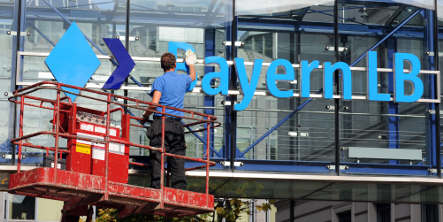Bayerische Landesbank said it would apply for €5.4 billion ($7.08 billion) in aid, taking advantage of a government-backed rescue plan worth €480 billion in direct aid and loan guarantees.
The southern regional bank, which is jointly owned by the state of Bavaria and regional savings banks, had invested heavily in asset-backed securities (ABS) which lost much of their value when the US market for high-risk, or subprime mortgages collapsed more than a year ago.
As it struggled to get back on its feet, BayernLB’s situation was slammed again when interbank loans dried up in the aftermath of a bankruptcy by the US investment bank Lehman Brothers in mid September.
On Monday, the cabinet finalised on Monday the conditions under which banks can make use of a €480-billion rescue package rushed through parliament last week.
By applying for the state aid, BayernLB will agree for example that its executives may earn no more than €500,000. Any dividend payments must go to the state and the government can also force the bank to reduce or give up entirely particularly risky lending practices, as well as to continue making loans to small and medium sized firms.
The programme passed by lawmakers on Friday includes €400 billion in loan guarantees in order to get banks lending to each other and up to €80 billion to shore up banks’ balance sheets battered by the financial crisis.
The rescue package, the biggest in postwar Germany, was similar to other measures announced by Germany’s partners in the 15-country eurozone along the lines of a British programme after crisis talks in Paris on October 12.
BayernLB, the second biggest German regional bank, posted a pre-tax loss of €770 million in the first quarter of 2008 that forced shareholders to come up with €4.8 billion in loan guarantees.
Landesbanken are a result of Germany’s federal political structure. They are publicly owned by local savings banks associations and regional authorities. As such they used to benefit from state guarantees that allowed them to extend credit at lower rates.
But “their business model does not work any more,” Merck Finck analyst Konrad Becker said. “The era when each state had its own bank is over.”
When the European Commission curbed the privilege in 2005, the banks were forced to look elsewhere for business and fell back on risky investments as a way to keep making money.
One possible solution for BayernLB is to merge with a powerful sister bank, Landesbank Baden-Wuerttemberg or LBBW, which would create a southern German banking powerhouse.
LBBW, the biggest regional bank, said last week that its level of shareholder funds was “very good” and that it did not need a cash injection from Berlin.



 Please whitelist us to continue reading.
Please whitelist us to continue reading.